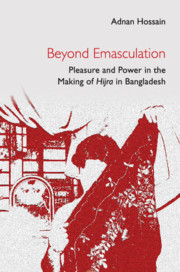Book contents
- Frontmatter
- Dedication
- Contents
- List of Figures
- Acknowledgements
- Introduction: Pleasure, Power and Masculinities
- 1 Kinship, Community and Hijragiri
- 2 Class-Cultural Politics and the Making of Hijras
- 3 Hijra Erotic Subjectivities: Pleasure, Practice and Power
- 4 The Paradox of Emasculation
- 5 Practices and Processes of Gendering
- 6 Love and Emotional Intimacy: Hijra Entanglement with Normative Bangla Men
- 7 Contemporary Transformation of Hijra Subjectivities
- Conclusion: Shifting Meaning and the Future of Hijras
- Glossary
- References
- Index
7 - Contemporary Transformation of Hijra Subjectivities
Published online by Cambridge University Press: 06 August 2021
- Frontmatter
- Dedication
- Contents
- List of Figures
- Acknowledgements
- Introduction: Pleasure, Power and Masculinities
- 1 Kinship, Community and Hijragiri
- 2 Class-Cultural Politics and the Making of Hijras
- 3 Hijra Erotic Subjectivities: Pleasure, Practice and Power
- 4 The Paradox of Emasculation
- 5 Practices and Processes of Gendering
- 6 Love and Emotional Intimacy: Hijra Entanglement with Normative Bangla Men
- 7 Contemporary Transformation of Hijra Subjectivities
- Conclusion: Shifting Meaning and the Future of Hijras
- Glossary
- References
- Index
Summary
Rita, a national-level hijra leader, has never been a part of a sadrali hijra group, that is, they never participated in either badhai or cholla manga, the two quintessential hijra occupations. From being a sex worker, they rose to national and international prominence in recent times for their HIV/AIDS activism. Once during an intense conversation involving Rita and a few other hijras working with NGOs, they remarked, ‘Bit by bit, hijragiri will taper off. The guru–cela hierarchy is tyrannical. With newer opportunities, hijras will move away from badhai and cholla manga.’ Poppy, another hijra also affiliated with NGOs, took slight exception to Rita's radical proposition and argued that with time hijras too should change and adopt new ways, but that these old traditions of badhai and cholla should be preserved. Taking a cue from Rita and Poppy, this chapter will identify and examine the newly emergent socio-cultural conditions and the possibilities of transformation. While the preceding chapters explicate the making of the hijra subjectivity and hijra occupation, here I am specifically interested in understanding the transformative possibilities in the wake of a series of trans-local initiatives recently being undertaken in contemporary Bangladesh. Ranging from government initiatives to NGO interventions, these recent bouts of activities have led to various forms of conflict and contestation over authenticity, cultural conceptualization of hijras, and idioms and other markers of identity. The transformations I chart in this chapter are not novel per se but are part and parcel of the themes I have been talking about throughout this book. Rather, what this chapter does is make some of those themes of transformation more explicit.
Nanda (1999) makes a passing reference to modernization and urbanization as factors responsible for the gradual de-popularization of the cultural roles of hijras as ritual performers in India. Older sadrali hijras in Bangladesh often echoed a similar sentiment linking the gradual wane of their popularity as ritual performers to the rise of videocassette recorder (VCR) and television and the advent of family planning and spread of condoms and contraceptives. While these aforesaid changes can be traced to such ongoing processes of modernization and urbanization, what I am specifically interested in here is a recent set of state and NGO interventions undertaken from the late 1990s in Bangladesh.
- Type
- Chapter
- Information
- Beyond EmasculationPleasure and Power in the Making of <I>hijra</I> in Bangladesh, pp. 181 - 204Publisher: Cambridge University PressPrint publication year: 2021



